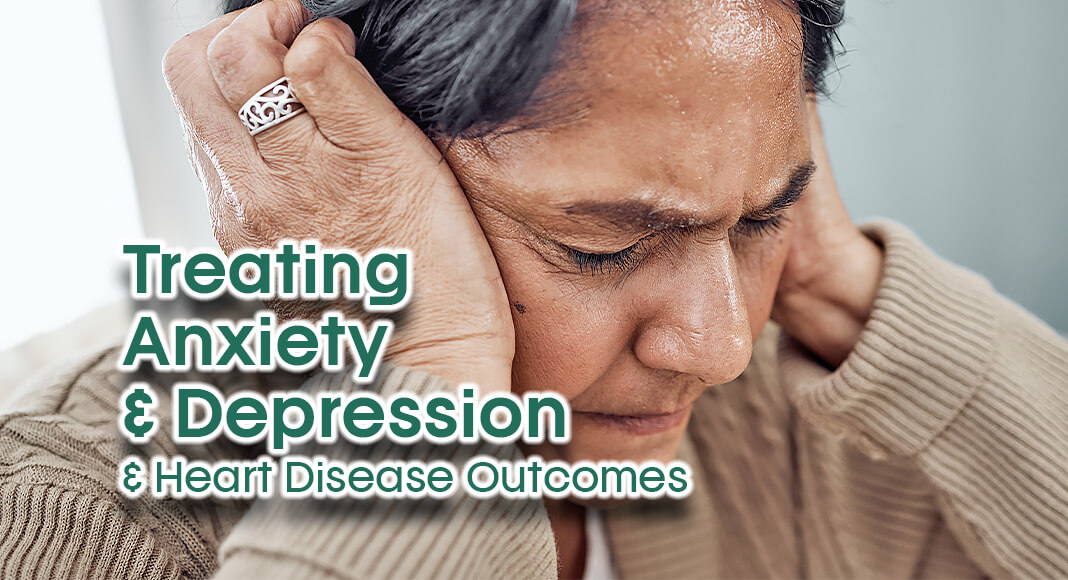
Mega Doctor News
By Ohio State University Wexner Medical Center
NEWSWISE – COLUMBUS, Ohio – Treating anxiety and depression significantly reduced emergency room visits and rehospitalizations among people with heart disease, according to a study by researchers at The Ohio State University Wexner Medical Center.
“For patients hospitalized for coronary artery disease or heart failure and who had diagnoses of anxiety or depression, treatment with psychotherapy, medication or both was associated with as much as a 75% reduction in hospitalizations or emergency room visits. In some cases, there was a reduction in death,” said lead study author Philip Binkley, MD, executive vice chair of the department of internal medicine and emeritus professor of internal medicine and public health at Ohio State Wexner Medical Center.
Binkley said anxiety and depression are common in people with heart failure, and mental health can have a major impact on a person’s risk of other health conditions, disability and death. The study published Wednesday in the Journal of the American Heart Association.
“This may be the first study to show that treating anxiety and depression with medication or psychotherapy has a significant impact on heart disease outcomes,” said first author Cheryl Carmin, PhD, a psychologist and director of behavioral cardiology services at the Wexner Medical Center, and clinical professor of psychiatry and behavioral health at the College of Medicine.
Binkley and colleagues examined whether talk therapy and antidepressant medications improved heart outcomes. Among their findings:
- For people who received both medication and talk therapy for anxiety or depression; the risk of hospitalization dropped 68 – 75%; the risk of being seen in the emergency department fell 67 – 74%, and the risk of death from any cause was reduced by about 67%.
- Talk therapy alone cut the risk of hospital readmission nearly in half (46 – 49%) and led to a similar reduction in emergency room visits (48 – 53%).
- Medication treatment alone reduced hospital readmission by up to 58% and reduced ER visits by up to 49%.
“Heart disease and anxiety/depression interact such that each promotes the other,” Binkley said. “There appear to be mental processes that link heart disease with anxiety and depression that are currently under investigation. Both heart disease and anxiety/depression are associated with activation of the sympathetic nervous system. This is part of the so-called involuntary nervous system that increases heart rate, blood pressure and can also contribute to anxiety and depression.”
Binkley hopes the study’s results will motivate cardiologists and health care professionals to screen routinely for depression and anxiety.
“A collaborative care model is essential to manage cardiovascular and mental health. Hopefully these findings inspire additional research regarding the mechanistic connections between mental health and heart disease,” he said.
Study details and background
- 1,563 adults ages 22 – 64 were enrolled over a three-year period. All participants had a first hospital admission for blocked arteries or heart failure and had two or more health insurance claims for an anxiety disorder or depression.
- 68% were women, and 81% were noted as white. All were enrolled in Ohio’s Medicaid program during the six months prior to the hospital admission. Health data was from two sources: Ohio Medicaid claims and Ohio death certificate files from July 1, 2009, to June 30, 2012.
- Participants were followed through the end of 2014 or until death or the end of Medicaid enrollment.
- About 23% of participants received both antidepressant medications and psychotherapy; nearly 15% received psychotherapy alone; 29% took antidepressants alone; and 33% received no mental health treatment.
- About 92% of participants in the study were diagnosed with anxiety and 55.5% with depression prior to hospitalization.










